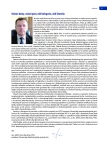The Prevalence of Diabetic Retinopathy in Slovakia
Authors:
Emil Martinka 1; Marta Ondrejková 2,3; Lucia Mikulová 1; Michaela Mišaníková 1,4; Monika Gajdošová 3; Mária Praženicová 2; Marianna Rončáková 1; Silvia Dókušová 1; Arash Davani 1
Authors‘ workplace:
Národný endokrinologický a diabetologický ústav, Ľubochňa
1; II. Očná klinika SZU , FNsP FDR, Banská Bystrica
2; Očné centrum OFTAL, s. r. o., Zvolen
3; Jesseniova lekárska fakulta UK a UN Martin
4
Published in:
Forum Diab 2016; 5(2): 87-93
Category:
Topic
Overview
According to the National Center of Medical Information, the prevalence of diabetic retinopathy (DR) in Slovakia is 19.9 %. Because this is less than average for Caucasians reported in literature (35.4 % for all diabetics, 77.3 % for Type 1, 25.2 % for Type 2 diabetes), we conducted an epidemiological survey.
Methods:
Four sources of data were used. 1) Randomized multicenter epidemiological study (RMES) on out-patients with either Type1 (DM1T) or Type2 (DM2T) diabetes (S1), 2) RMES in out-patients with DM2T (S2), 3) RMES in patients with DM1T or DM2T hospitalized in diabetes center (DC) during the third quarter 2014 (S3) and 4) RMES in patients with DM1T or DM2T hospitalized in DC during the first quarter of 2015 (S4). In S1 and S2 the prevalence of DR was assessed using source documentation (SD). In S3 prevalence of DR was assessed using fundus photography (FP) performed in all patients. In S4 the prevalence of DR was assessed using SD and FP performed in those patients without relevant information regarding DR in source documentation. Results are given in tab. 1.
Conclusions:
Total prevalence of DR in out-patients with all DM, DM1T, DM2T and hospitalized DM1T patients in Slovakia is lower than the average in the literature. In hospitalized DM2T patients the prevalence of DR was higher than average in literature. This was probably because the hospitalized DM2T patients were more complicated and had longer duration of DM.
Key words:
diabetes mellitus – diabetic retinopathy – prevalence
Sources
1. Patel A, MacMahon S, Chalmers J et al. [ADVANCE Collaborative Group]. Effects of a fixed combination of perindopril and indapamide on macrovascular and microvascular outcomes in patients with type 2 diabetes mellitus (the ADVANCE trial): a randomised controlled trial. Lancet 2007; 370(9590): 829–840.
2. Chew EY, Ambrosius WT, Davis MD et al. [ACCORD Study Group. ACCORD Eye Study Group]. Effects of medical therapies on retinopathy progression in type 2 diabetes. N Engl J Med 2010; 363(3): 233–244. Erratum in N Engl J Med 2011; 364(2): 190. N Engl J Med 2012; 367(25): 2458.
3. Ding J, Wong TY. Current epidemiology of diabetic retinopathy and diabetic macular edema. Curr Diab Rep 2012; 12(4): 346–354. Dostupné z DOI: <http://dx.doi.org/10.1007/s11892–012–0283–6>.
4. [Diabetes Control and Complications Trial (DCCT) Research Group]. The effect of intensive treatment of diabetes on the development and progression of long-term complications in insulin-dependent diabetes mellitus. New Engl J Med 1993; 329(14): 977–986.
5. Nathan DM, Zinman B, Cleary PA et al. [Diabetes Control and Complications Trial/Epidemiology of Diabetes Interventions and Complications (DCCT/EDIC) Research Group]. Modern-day clinical course of type 1. Diabetes mellitus after 30 years’ duration. The Diabetes Control and Complications Trial/Epidemiology of Diabetes Interventions and Complications and Pittsburgh Epidemiology of Diabetes Complications Experience (1983–2005). Arch Intern Med 2009; 169(14): 1307–1316.
6. Hogg R. Epidemiology of Diabetic Retinopathy [on line]. Diapedia 2014; 11. Dostupné z DOI: <http://dx.doi.org/10.14496/dia.71040851101.11>.
7. Holman RR, Paul SK, Bethel MA et al. 10-Year follow up of intensive glucose control in type 2 diabetes. N Engl J Med 2008; 359(15): 1577–1589.
8. Klein R, Klein BEK, Moss SE et al. Prevalence of diabetes mellitus in southern Wisconsin. Am J Epidemiol 1984; 119(1): 54–61.
9. Malone JI, Morrison AD, Pavan PR et al. Diabetic Control and Complications Trial. Prevalence and significance of retinopathy in subjects with type 1 diabetes of less than 5 years’ duration screened for the diabetes control and complications trial. Diabetes Care 2001; 24(3): 522–526.
10. Činnosť diabetologických ambulancií v SR 2014. NCZI: Bratislava 2015. Dostupné z WWW: <http://www.nczisk.sk/Documents/publikacie/2014/zs1511.pdf>.
11. Ng DP. Human Genetics of Diabetic Retinopathy. J Ophthalmol 2010; 2010. pii: 172593. Dostupné z DOI: <http://dx.doi.org/10.1155/2010/172593>.
12. Porta M, Maldari P, Mazzaglia F. New approaches to the treatment of diabetic retinopathy Diabetes Obes Metab 2011; 13(9): 784–790.
13. Silva PS, Cavallerano JD, Sun JK et al. Effect of systemic medications on onset and progression of diabetic retinopathy Nat Rev Endocrinol 2010; 6(9): 494–508. Dostupné z DOI: <http://dx.doi.org/10.1038/nrendo.2010.122>.
14. [UK Prospective Diabetes Study (UKPDS) Group]. Intensive blood-glucose control with sulphonylureas or insulin compared with conventional treatment and risk of complications in patients with type 2 diabetes (UKPDS 33). Lancet 1998; 352(9131): 837–853. Erratum in Lancet 1999; 354(9178): 602.
15. [UK Prospective Diabetes Study Group]. Tight blood pressure control and risk of macrovascular and microvascular complications in type 2 diabetes: UKPDS 38. BMJ 1998; 317(7160): 703–713.
16. Uthra S, Raman R, Mukesh BN et al. Genetics of Diabetic Retinopathy. Int J Hum Genet 2008; 8(1–2): 155–159.
17. Williams R, Airey M, Baxter H et al. Epidemiology of diabetic retinopathy and macular oedema: a systematic review. Eye (Lond) 2004; 18(19): 963–983.
18. Xie XW, Xu L, Wang YX et al. Prevalence and associated factors of diabetic retinopathy. The Beijing Eye Study 2006. Graefes Arch Clin Exp Ophthalmol 2008; 246(11): 1519–1526. Dostupné z DOI: <http://dx.doi.org/10.1007/s00417–008–0884–6>.
19. Yau, JWY, Rogers, SKL et al. Global Prevalence and Major Risk Factors of Diabetic Retinopathy. Diabetes Care 2012; 35(3): 556–564.
20. Zhang X, Saaddine JB, Chou CF et al. Prevalence of Diabetic Retinopathy in the United States, 2005–2008. JAMA 2010; 304(6): 649–656. Dostupné z DOI: <http://dx.doi.org/10.1001/jama.2010.1111>.
Labels
Diabetology Endocrinology Internal medicineArticle was published in
Forum Diabetologicum

2016 Issue 2
Most read in this issue
- Consensual therapeutic algorithm for treatment with insulin pump and continuous monitoring of glucose levels (in compliance with the indicative limitations as amended)
- Consensual therapeutic algorithm for type 2 diabetes mellitus (in accordance with SPC, ADA/EASD indicative limitations and recommendations )
- Kidney transplantation and metabolic syndrome
- Iatrogenic hypoglycemia as a serious medical problem
